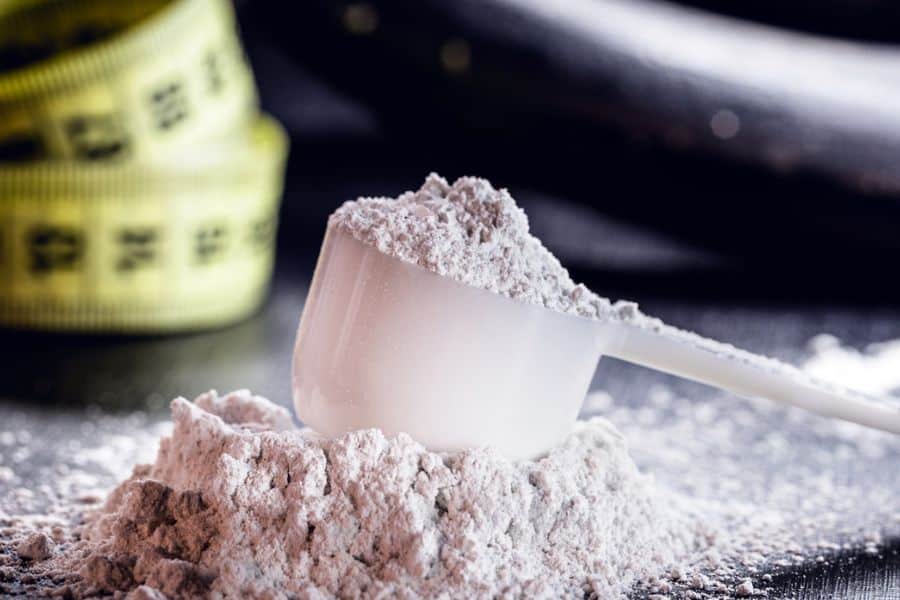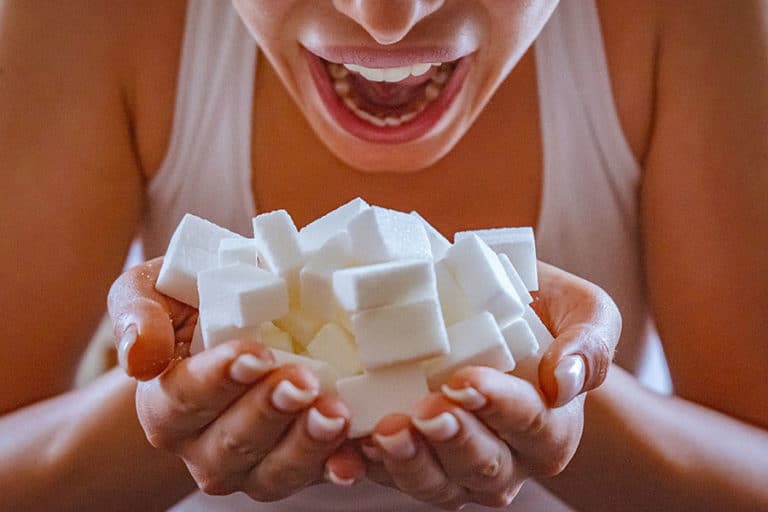How Long Does Creatine Take To Work? Timeline And Effects

How Long Does It Take | Recommended Dosage | Phased Loading Vs Single Serving Per Day | Effects Timeline | Benefits | Risks | Factors Affecting Creatine Results | When You Stop | Buying Creatine | FAQs
Creatine is a popular supplement used by athletes and fitness enthusiasts to enhance their performance and muscle growth. But how long does it take for creatine to start working? Here we try to decode the timeline of creatine’s effects.
How Long Does Creatine Take To Work?
Creatine takes about 28 days [1]Cleveland Clinic: Creatine and Creatine Supplements to start showing its effects. However, to get a better picture of how long does it take for creatine to kick in, let us understand creatine itself, its function in our body, recommended range for consumption of creatine, and a timeline of how it works.
How creatine works in the body?
Creatine works by converting ADP (adenosine diphosphate) into ATP (adenosine triphosphate). This conversion increases the body’s ability to produce immediate energy and results in muscular contractions.
Creatine supplements work similarly. They provide an increased amount of creatine which then helps to convert ADP into ATP more efficiently. As a result, the muscles are able to work harder for longer, resulting in increased fat-free muscle mass and higher strength levels.
Infact, a study by the International Society of Sports Nutrition(ISSN), [2]National Library of Medicine: International Society of Sports Nutrition position stand: safety and efficacy of creatine supplementation in exercise, sport, and medicine has deemed creatine monohydrate supplement as “the most effective ergogenic nutritional supplement currently available to athletes with the intent of increasing high-intensity exercise capacity and lean body mass during training.”
How much creatine should you consume?
It is generally recommended that anyone looking to boost muscle mass, energy, and strength should follow the front loading phase followed by the maintenance phase of creatine supplementation.
Here is a quick look at the recommended range for creatine consumption for both phases.
Phased creatine loading
The most popular approach to phased loading is to consume 5g of creatine monohydrate [3]PubMed: Elevation of creatine in resting and exercised muscle of normal subjects by creatine supplementation supplement 4 times a day for 5-7 days (for increasing muscle creatine).
Alternatively, you can use a formula to determine your ideal daily dosage. Just multiply your weight in kilograms by 0.3. [4]Journal of the International Society of Sports Nutrition: Common questions and misconceptions about creatine supplementation: what does the scientific evidence really show? For instance, if your body weight is 85 kilos:
85 X 0.3 = 25.5
Thus, your ideal daily dose of creatine would be 25.5g.
Maintainance phase
Once you have completed the loading phase, it is recommended to reduce your daily dosage to a maintenance dosage of 3-5 grams per day.
It is important to note that you can skip the loading phase altogether and just start with the maintenance dosage of 3-5 grams per day.
Effects of phased loading of creatine vs single serving per day
Phased loading of creatine is believed to result in higher muscle creatine levels than single servings per day. This approach has been shown to be more effective for increasing muscle creatine levels than taking a single serving per day.
Phased loading has been observed to result in more than 3-4 fold increase in muscle creatine levels compared to taking a single serving per day.
Effects of creatine: Timeline
Here is a phase-wise observation of the effects of creatine on the body:
1 week
This is when you see the initial increase in muscle mass and possibly even overall weight.
1 month
After one month of creatine supplementation, your muscles will have more stored energy and be better equipped to perform explosive exercises. You will see visible improvements in your performance in the gym and on the field.
Benefits of taking creatine supplements
The benefits of creatine go beyond the generally expected muscle and performance gains. Here is a closer analysis of the major benefits of creatine:
1. Explosive energy
Creatine helps to quickly convert ADP (adenosine diphosphate) into ATP (adenosine triphosphate), providing more energy for faster muscle contractions and more powerful movements.
Taking creatine supplements increases the body’s capacity to produce ATP, which can result in explosive energy. This increase in ATP is what supports exercises that require contractions, explosive power, and anaerobic strength.
2. Performance gains in high-intensity exercises
High-intensity exercises require a specific type of strength that is akin to the kind that creatine supplementation provides. Unsurprising then, that creatine supplementation is common among athletes that engage in high-intensity exercises.
Creatine is believed to improve performance in short-duration, high-intensity exercises like weight lifting and sprints.
3. Builds muscle
An increase in the intracellular pool of creatine stores have been linked to an increase in fat free muscle mass. [5]MDPI: Creatine for Exercise and Sports Performance, with Recovery Considerations for Healthy Populations The resultant increase in body mass has been one of the reasons behind the false linking of creatine and weight gain.
4. Aids recovery
Studies [6]PubMed: Creatine supplementation enhances muscle force recovery after eccentrically-induced muscle damage in healthy individuals have observed the positive impact of creatine supplementation on exercise-induced muscle damage. This may be due to the presence of arginine in its molecules, [7]National Library of Medicine: Creatine supplementation with specific view to exercise/sports performance: an update which produces an antioxidant effect that reduces radical damage in the muscles.
Moreover, by increasing muscle strength and by reducing muscle tightness, creatine can reduce the incidence of muscle injury in the first place.
5. Brain health
Studies on the impact of creatine’s effects on brain health are neither conclusive nor adequate to support sweeping claims. However, there may be some merit to the notion that creatine benefits brain health. Creatine after all, is found in small concentrations in the brain and it is believed that creatine can increase the activity of brain neurotransmitters.
Risks Associated with Creatine Use
The consumption of creatine is not without its risks and drawbacks. Below is a list of commonly observed risks associated with creatine use:
- Renal damage
- Liver toxicity
- Muscle cramps
- Vomiting
- Diarrhea
- Bloating
- Dehydration
- Weight gain
Factors that affect the rate at which creatine works
The rate at which creatine works varies from person to person, depending on various factors. A closer look at some of the important factors:
1. Type of creatine
Each type of creatine supplement can have its own rate of absorption and how quickly it works. For example, creatine monohydrate is the slowest acting form of creatine, while kre-alkalyn and creatine ethyl ester are the fastest.
2. Quality of your supplement
The quality of the creatine can also play a role in how quickly it works. Make sure you are buying your supplements from a trusted manufacturer and that it is of good quality.
3. Diet
The type of diet you consume will have an effect on how quickly creatine works. For example, a high carbohydrate diet has been shown to increase the uptake of creatine in muscle cells.
4. Consistency
Consistency is key when taking creatine supplements. It takes time for the creatine to build up in your system, and you need to take it regularly for it to work effectively. How punctually and consistently you follow the loading phase and maintenance phase protocols will impact the outcome of your supplementation.
5. Type of workout you perform
Creatine aids in the performance of high-intensity activities and workouts. Consequently, people who perform activities that demand a lot of power can expect to see results faster than those who engage in more low-intensity activities.
What happens when you stop taking creatine?
If you plan to discontinue your creatine supplementation, you must be aware of the potential results of the same. The most important fallouts include:
- Your body’s creatine levels will drop due to the lack of external supplementation.
- The body’s own capacity to produce endogenous creatine stores may be negatively affected.
- You will observe a loss in muscle mass and muscle strength.
- Since creatine is osmotic, discontinuing creatine supplements will lead to a reduction in water weight.
- You may experience increased fatigue. Watch out for some mental effects as well since creatine tends to impact cognitive performance.
Where and how to buy creatine?
Creatine supplements are easily available at your local health food store and from online retailers.
It is important to ensure you buy quality creatine supplements. Poor quality products may be contaminated with heavy metals or other impurities that can have detrimental effects on your health. Learn to read food labels and make sure to double-check the label of any creatine product before buying.
If you are a vegetarian or a vegan, you have to be careful when you buy creatine as most creatine products are obtained or manufactured from animal sources.
It is also recommended to consult your physician or nutritionist if you have any questions or doubts about how long does creatine take to work and what type of creatine supplements to buy.
Conclusion
Creatine supplementation has been found to help athletes increase their muscle mass, strength, and explosive power. However, it is important to note that how long creatine takes to work depends on a number of factors. How you consume creatine and how consistent your dosage is will also affect how quickly the effects show up.
FAQs
We have tried to answer the most commonly asked questions about creatine and its effects on the body here:
How do you know if creatine is working?
It takes about a week for the first effects of creatine to show up. By this time you should start experiencing an increase in your training volume.
How fast will creatine make you bigger?
During the first week of creatine loading you can expect to gain 3-5 pounds. This is water weight since creatine increases the amount of intracellular water.
Is creatine weight gain permanent?
No. the initial weight gain during the loading phase in particular is mostly water weight. This goes away a few weeks later, once the maintenance phase begins.
References
| ↑1 | Cleveland Clinic: Creatine and Creatine Supplements |
|---|---|
| ↑2 | National Library of Medicine: International Society of Sports Nutrition position stand: safety and efficacy of creatine supplementation in exercise, sport, and medicine |
| ↑3 | PubMed: Elevation of creatine in resting and exercised muscle of normal subjects by creatine supplementation |
| ↑4 | Journal of the International Society of Sports Nutrition: Common questions and misconceptions about creatine supplementation: what does the scientific evidence really show? |
| ↑5 | MDPI: Creatine for Exercise and Sports Performance, with Recovery Considerations for Healthy Populations |
| ↑6 | PubMed: Creatine supplementation enhances muscle force recovery after eccentrically-induced muscle damage in healthy individuals |
| ↑7 | National Library of Medicine: Creatine supplementation with specific view to exercise/sports performance: an update |







